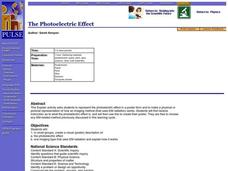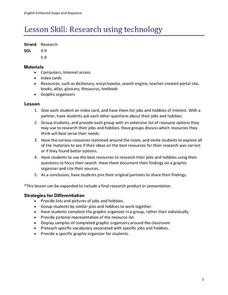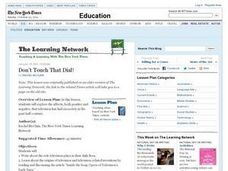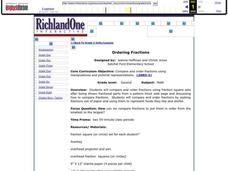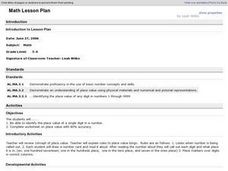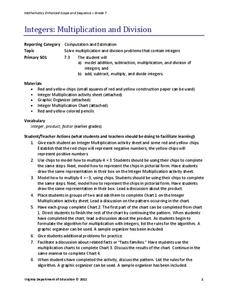EngageNY
The Relationship of Multiplication and Division
Take any number, multiply it by five, and then divide by five. Did you end up with the original number? In the same vein as the previous lesson, pupils discover the relationship between multiplication and division. They develop the...
Curated OER
Finding Polygons in Cubist Art
Fourth graders explore geometric properties and relationships in a two-dimensional work of art. They first search for and identify polygons in a Cubist painting and then use polygons to create their own Cubist portrait of a classmate.
Curated OER
The Photoelectric Effect
After some online instruction, chemistry aces use their creative abilities to produce a poster describing the photoelectric effect and one type of imaging technology that uses electromagnetic radiation. This simple, straightforward...
Alabama Learning Exchange
CELEBRATE!
Strengthen research skills by reviewing the months of the year and the holidays celebrated during those months. Learners draw and label a timeline for the months and label each holiday. They work in groups to research the holidays, and...
Curated OER
Research Using Technology
Pupils receive an index card, and they write down jobs and hobbies that interest them. Then, they get together in groups and are assigned the task of researching the jobs and hobbies that are of the most interest to the entire group....
Tennessee State Museum
Deciphering the Document: Unlocking the Meaning of the Emancipation Proclamation
Help your learners truly understand the Emancipation Proclamation by asking them the put it into their own words. After reading the document out loud to the class, and briefly discussing the legal language, split your class into small...
Curated OER
Don't Touch That Dial!
Students explore the affects, both positive and negative, that television has had on society in the past half-century. They read the article "Inside the Soap Opera of Television's Early Days."
Curated OER
Civil War and Reconstruction
Learners examine the differences between the North and South during the pre-Civil War era. In this Civil War era lesson plan, students spent 7 days looking at things that were different between the Union and Confederate state before the...
Curated OER
Are We Couch Potatoes or Busy Bees? Data Analysis of Physical Activity in School
Young scholars study practical data analysis within the constraints of the scientific method. In this data lesson plan students collect and enter data into a computer spreadsheet then create graphs.
Curated OER
A Human Number Line
Sixth graders create a human number line through use of symbols, equality, inequality, addition, subtraction, solving equations and inequalities
Alabama Learning Exchange
The Grouchy Ladybug
Students listen to the book, "The Grouchy Ladybug" by Eric Carle and sequence the events in the story. Using a graph, they draw and color the animals that the ladybug meets next to the corresponding time from the story, and conduct...
Curated OER
Away We Go!
Students study types of transportation. In this transportation lesson, students survey several classes to gather data on how they get to school. Students create a transportation graph.
Curated OER
When is Your Birthday?
Students use data about their birthdays to create graphs. In this collecting and communicating information lesson, students make a class list of their birthdays. Students use the information to make a bar graph showing the information.
Curated OER
Ordering Fractions
Second graders use shapes to create various fractions. In this fractions lesson, 2nd graders define a fraction, visit a website where they make fractions using various shapes, and use a fraction square set to create and name fractions.
Curated OER
One * Two * Three * Story
Second graders explore sequencing by drawing events of a story in order. In this sequence of events lesson, 2nd graders are read a story such as "The 3 Little Pigs", they recall the events from the fairy tale in order, visit an...
Curated OER
How Much Salt is in the Gsl Water?
Fourth graders study the water cycle and the different processes that are involved, like precipitation, evaporation, etc. They conduct an experiment observing the water cycle in action and write a hypothesis, observations and...
Curated OER
Quilting Our Diverse Classroom
Students explore diversity and race by creating art. In this ethnic background lesson, students discuss their family history, where their relatives lived and how it affects their life today. Students create pieces of a quilt representing...
Curated OER
Investigation - Dressing the Baby
Second graders complete an inquiry activity to determine how many combinations they can make using cut-outs of tops and bottoms. In this combinations and organized lists table, 2nd graders work with three colored cut-outs of tops and...
Curated OER
Fractions
First graders create fraction creatures by using 1 inch squares of construction paper. In this fractions lesson plan, 1st graders name the fractions within their whole creatures.
Curated OER
Place Value Bingo
Students identify the place value of numbers from 1-10,000. In this place value lesson, students play a bingo game with place value. Students answer questions about place value on a worksheet.
Curated OER
"A Pig is Big"
Students explore the concept of big, bigger, and biggest. They examine and classify items by size, listen to and discuss the book "A Pig is Big," complete a fill in the blank activity, and create a tri-fold that illustrates two items...
Virginia Department of Education
Integers: Multiplication and Division
Rules are meant to be broken ... but not integer multiplication and division rules. Learners use chips to model integer multiplication and division. The results of the activity help them develop integer rules for these operations.
Curated OER
Quilting
Students use a monochromatic palate, select shades and tints for a selected hue, or select complimentary or analogous colors for a quilt design. They design quilt squares using basic geometric shapes, repetition, balance, and proportion.
Curated OER
Compound Inequalities and Graphing
Put geometry skills to the test! Learners solve compound inequalities and then graph the inequalities on a coordinate plane using their geometric skills. They identify the slope and y-intercept in order to graph correctly. I like this...




